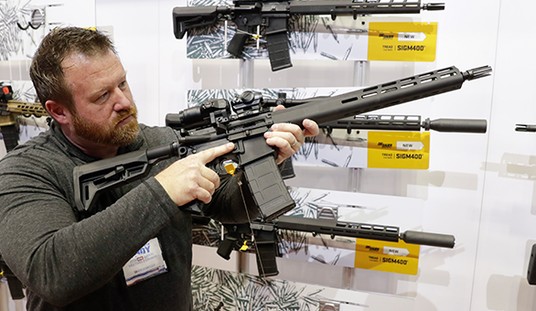Wearing shorts and a tee shirt and driving a pickup truck, John McNamara looks right at home among the locals in tiny Aynor, South Carolina. He only starts looking slightly out-of-place when you start paying attention to the details. His pickup has a Connecticut license plate, and his voice, while pleasant, seriously lacks “twang.”
Fortunately for the economy of Aynor, Vice President of Sales and Administration McNamara is one of 20 PTR Industries employees that relocated to Horry County to build their version of the G3-style roller-locked rifle after Connecticut passed an ill-considered, poorly crafted raft of gun control legislation in the wake of the Sandy Hook school massacre.
* * *
PTR Industries, as we now know it, almost didn’t exist.
Jose Diaz, who founded JLD Enterprises, purchasing blueprints and tooling from Fabrica Militar of Portugal, and began building PTR-91 rifles that were based upon the Heckler & Koch G3/HK91 rifle system. Early rifles were built from a combination of JLD manufactured parts and military surplus parts kits. The JLD-manufactured rifles had a high degree of parts commonality with the original HK91.
Mr. Diaz knew the gun-building side of the equation very well, but had problems as a businessman. He borrowed money from his landlord, Everett Weed, and to forgive Diaz’s debt, Weed took a controlling interest in the company. Diaz stayed on for a number of years before leaving in 2010. The company, known as PTR Industries since 2005, then shifted from being an assembly based company into becoming a true manufacturer.
Things were going well for the company on December 14, 2012, and PTR CEO Josh Fiorini was about to have a meeting with an architect to discuss expansion plans when news of the unfolding attack on Sandy Hook Elementary School some 30 miles away began flooding the local airwaves.
He cancelled the meeting with the architect, and like the rest of the gun industry based out of Connecticut’s famed “gun valley,” PTR prepared to weather the coming political storm that they were sure was headed their way.
* * *
The receiver flat that becomes the serialized part that the government recognizes as the gun doesn’t start out looking like much. It’s just an irregularly shaped piece of metal in a large stack of similar parts, until these parts start flowing through a series of steps on this relatively simply stamping machine.

A series of dies are used to stamp, bend, and shape the receiver flat into the receiver.

Other machines on the factory floor shape barrel blanks, cut rifling, and shape chambers. They manufacture trunnions, bolt heads, bolt carriers, and bolt carriers. Piece by piece and part by part, a rifle begins to take shape.
* * *
Originally, the processes to manufacture these rifles took place in the cramped confines of PTR’s Bristol, Connecticut shop, but that was before anti-gun politicians in the legislature from both parties felt the political need to “do something” after Adam Lanza murdered his mother and 26 innocent souls at Sandy Hook Elementary School.
Anti-gun Democrats standing on the bloody pulpit felt that they had a blank check to write the sort of prohibitive anti-gun legislation they’d long fantasized about, and craven Republicans went along with them every step of the way, whining that if they didn’t give in to the poorly written and punitive restrictions, then the anti-gun forces of Connecticut Governor Dannel Malloy would just force through something worse.
Most of us are familiar with the blatantly unconstitutional gun and magazine registration requirements imposed upon Connecticut’s gun owners by these tragedy-exploiting laws, but few grasp the impact of the legislation on manufactures.
In a statement delivered to Connecticut’s legislature (PDF), Fiorini warned lawmakers of what their proposed legislation would mean to the region’s firearms manufacturers. He warned that the laws being proposed would lead to the harassment of vendors, shippers, and manufacturers, potentially leading to the arrest of employees for simply doing their jobs.
For example, the legislation made no differentiation between magazines being sold by a manufacturer to the out-of-state market, and those owned by Connecticut residents. PTR has more than 100,000 20-round magazines in its warehouse area. Under Connecticut’s absurd laws, each and every one would have to be serial numbered and registered, with each magazine requiring a fingerprint and photo ID of a PTR employee. It would have taken months, if not years, for the company to comply with just this one aspect of the law.
Fiorini’s statement fell on deaf ears, as the legislature pushed forward with their witch hunt.
Weed and Fiorini sat in the gallery of Connecticut legislature as politicians rammed through the bill in a collective madness, and decided then and there that PTR must leave a state that had lost its mind in a toxic stew of deep grief and savage political opportunism.
* * *
South Carolina rolled out the welcome mat for PTR Industries, and Vice President McNamara rattled of the list of politicians from Governor Nikki Haley, U.S. Senator Lindsey Graham, on down through state and local politicians who have welcomed PTR with open arms, and who stay in regular contact with the company. Local businesses are equally as hospitable. The week I visited a local restaurant, the Aynor Inn, had just delivered a load of pizzas to the plant as a way of saying “thank you” for coming south.
South Carolina’s generous hospitality has to be welcome after the brutal treatment PTR Industries received in their home state, but the company is adapting well, and they’re thriving. In addition to the work they’ve done to expand production of PTR-91 rifles, they now have the capacity to do specialized work for other gun companies, and they’re actively pursuing that side of the business as well.

As part of a “thank you” to the Palmetto State’s hospitality, the company is issuing a “South Carolina” commemorative edition rifle (PTR SCCR). Presently, the company doesn’t appear to be able to keep the SCCR in stock.
More than a dozen of the commemorative rifles were in various stages of assembly as I toured the factory, and while I’m not normally a commemorative edition kind of guy, the rifles were strikingly beautiful.
As for the PTR rifles themselves, they shoot beautifully. I’d never fired one before visiting the PTR facility in Aynor, and took the opportunity to put several magazines of bullets downrange into a berm 300 yards away. I can hardly wait to get one for review.

Eventually, this impromptu shooting range will go away. It is a part of business park that is currently undeveloped except for PTR and the underground utilities and streets needed to support other businesses. That could easily change at any time, as the rest of Connecticut’s “gun valley” considers fleeing the state’s absurd laws and regulations. Colt and Stag Arms are just two of the industry giants rumored to be looking to leave the absurdly titled “Constitution State,” and it wouldn’t be surprising to see other gun companies in other unfriendly states such as Maryland and New York consider moving to South Carolina’s hospitable business environment.
* * *
When PTR was packing up to leave Connecticut, a local reporter asked John McNamara if he had any regrets about being part of the gun industry.
In a moment that surprised her, he related that while he’s relatively new to the gun culture, he has never regretted his involvement in a company where many of the employees are friends who have hung out together since their teen-aged years.
His big regret, he says, is that for a decade he was part of the telecom industry that developed text messaging and made people dependent on cell phones and “must have” technologies that tether people to devices instead of relationships.
Families and friends don’t talk anymore. They look down, and they text, and zone out… and the world passes them by. They miss nature. They miss conversations. They miss the world around them. That is what McNamara regrets being a part of, not part of a shooting industry that is like a large family.
The reporter didn’t run that story. It wasn’t a story that the anti-gun media in a state controlled by rabidly anti-gun Democrats was willing to tell.
PTR is looking to grow their staff up to 120 employees in just a few years. Thanks to Connecticut Governor Malloy’s radical hatred of the gun industry, these jobs will be filled by folks with a twang in their voices, and freedom in their hearts.










Join the conversation as a VIP Member